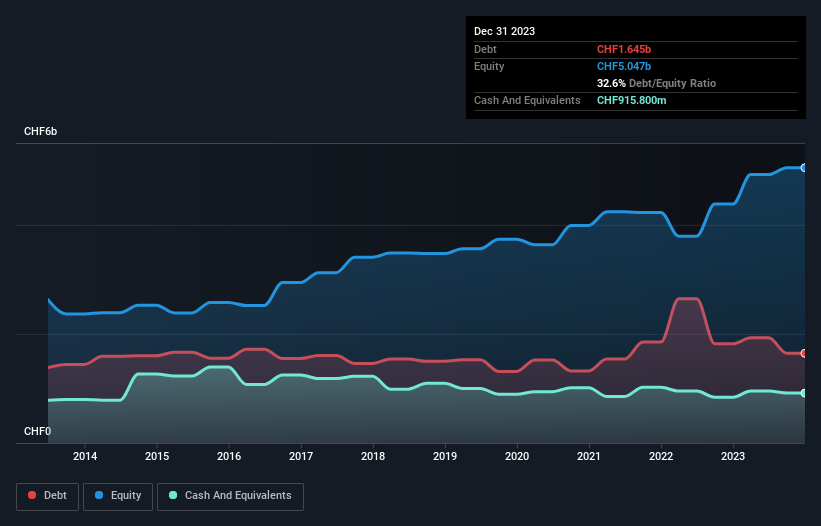Warren Buffett famously said, 'Volatility is far from synonymous with risk.' So it might be obvious that you need to consider debt, when you think about how risky any given stock is, because too much debt can sink a company. We note that BKW AG (VTX:BKW) does have debt on its balance sheet. But the real question is whether this debt is making the company risky.
Why Does Debt Bring Risk?
Generally speaking, debt only becomes a real problem when a company can't easily pay it off, either by raising capital or with its own cash flow. Part and parcel of capitalism is the process of 'creative destruction' where failed businesses are mercilessly liquidated by their bankers. However, a more usual (but still expensive) situation is where a company must dilute shareholders at a cheap share price simply to get debt under control. By replacing dilution, though, debt can be an extremely good tool for businesses that need capital to invest in growth at high rates of return. The first step when considering a company's debt levels is to consider its cash and debt together.
See our latest analysis for BKW
How Much Debt Does BKW Carry?
The image below, which you can click on for greater detail, shows that BKW had debt of CHF1.64b at the end of December 2023, a reduction from CHF1.82b over a year. On the flip side, it has CHF915.8m in cash leading to net debt of about CHF729.1m.

How Strong Is BKW's Balance Sheet?
According to the last reported balance sheet, BKW had liabilities of CHF2.16b due within 12 months, and liabilities of CHF3.80b due beyond 12 months. Offsetting these obligations, it had cash of CHF915.8m as well as receivables valued at CHF1.42b due within 12 months. So its liabilities outweigh the sum of its cash and (near-term) receivables by CHF3.62b.
While this might seem like a lot, it is not so bad since BKW has a market capitalization of CHF7.52b, and so it could probably strengthen its balance sheet by raising capital if it needed to. But it's clear that we should definitely closely examine whether it can manage its debt without dilution.
We measure a company's debt load relative to its earnings power by looking at its net debt divided by its earnings before interest, tax, depreciation, and amortization (EBITDA) and by calculating how easily its earnings before interest and tax (EBIT) cover its interest expense (interest cover). This way, we consider both the absolute quantum of the debt, as well as the interest rates paid on it.
BKW's net debt is only 0.81 times its EBITDA. And its EBIT covers its interest expense a whopping 11.6 times over. So we're pretty relaxed about its super-conservative use of debt. It is just as well that BKW's load is not too heavy, because its EBIT was down 31% over the last year. Falling earnings (if the trend continues) could eventually make even modest debt quite risky. When analysing debt levels, the balance sheet is the obvious place to start. But ultimately the future profitability of the business will decide if BKW can strengthen its balance sheet over time. So if you want to see what the professionals think, you might find this free report on analyst profit forecasts to be interesting.
But our final consideration is also important, because a company cannot pay debt with paper profits; it needs cold hard cash. So it's worth checking how much of that EBIT is backed by free cash flow. Looking at the most recent three years, BKW recorded free cash flow of 30% of its EBIT, which is weaker than we'd expect. That's not great, when it comes to paying down debt.
Our View
BKW's EBIT growth rate was a real negative on this analysis, although the other factors we considered cast it in a significantly better light. For example its interest cover was refreshing. We should also note that Electric Utilities industry companies like BKW commonly do use debt without problems. Taking the abovementioned factors together we do think BKW's debt poses some risks to the business. So while that leverage does boost returns on equity, we wouldn't really want to see it increase from here. Over time, share prices tend to follow earnings per share, so if you're interested in BKW, you may well want to click here to check an interactive graph of its earnings per share history.
At the end of the day, it's often better to focus on companies that are free from net debt. You can access our special list of such companies (all with a track record of profit growth). It's free.
Valuation is complex, but we're here to simplify it.
Discover if BKW might be undervalued or overvalued with our detailed analysis, featuring fair value estimates, potential risks, dividends, insider trades, and its financial condition.
Access Free AnalysisHave feedback on this article? Concerned about the content? Get in touch with us directly. Alternatively, email editorial-team (at) simplywallst.com.
This article by Simply Wall St is general in nature. We provide commentary based on historical data and analyst forecasts only using an unbiased methodology and our articles are not intended to be financial advice. It does not constitute a recommendation to buy or sell any stock, and does not take account of your objectives, or your financial situation. We aim to bring you long-term focused analysis driven by fundamental data. Note that our analysis may not factor in the latest price-sensitive company announcements or qualitative material. Simply Wall St has no position in any stocks mentioned.
About SWX:BKW
BKW
An international energy and infrastructure company, plans, builds, and operates infrastructure to produce and supply energy to businesses, households, and the public sector in Switzerland, Germany, Italy, France, and internationally.
Excellent balance sheet established dividend payer.
Market Insights
Community Narratives



